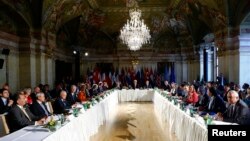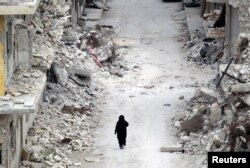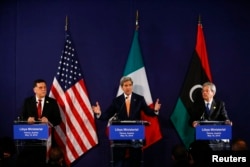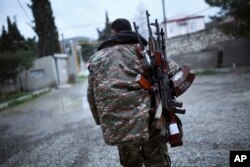The five-year-old war in Syria was the focus of diplomats Tuesday in Vienna where the 17-nation International Syria Support Group (ISSG) met to discuss stalled political talks, difficulties in maintaining a cease-fire deal and uneven U.N. results in delivering humanitarian aid.
The cease-fire, which went into effect at the end of February, brought a dramatic drop in overall violence in Syria, but that progress has slowly eroded.
“Today is about creating the conditions to better comply with the cease-fire,” said German Foreign Minister Frank-Walter Steinmeier, heading into talks. He said another goal would be improving conditions on the ground in Syria so that the opposition would be more inclined to participate in political talks.
The United States and Russia are trying to use their influence to convince competing sides to stand by the agreement as they also try to support peace talks that have so far made little progress.
Both countries are part of the ISSG. But while Russia has backed the Syrian regime, the U.S. has been supporting the moderate opposition.
U.S. Secretary of State John Kerry and Russian Foreign Minister Sergey Lavrov met Monday to discuss Syria’s crisis. Russia’s Interfax news agency said a need to cut off “terrorists’” supply routes between the Syrian-Turkish border was among issues discussed.
Syrian aid
The cease-fire was also meant to make it easier to get aid deliveries to Syrians who are badly in need of help, especially those in areas besieged by either rebels or government forces.
But the U.N. and humanitarian groups have reported attacks on convoys and thefts of supplies. Also, the Syrian regime has blocked humanitarian access to some besieged areas.
The U.N. has pushed the goal of finding a negotiated political settlement to the conflict that has left hundreds of thousands of people dead and millions more either as refugees or displaced within Syria. One major sticking point that remains as the ISSG holds its latest meeting is the fate of Syrian President Bashar al-Assad, whom the U.S. and other Western powers want to step down. Assad and his ally Russia have resisted the idea.
The ISSG should keep pressing for a comprehensive political solution, said Perry Cammack, a Middle East analyst at the Carnegie Endowment for International Peace.
“Make it clear that there is no give in the demand that Assad not be around at the end,” he said.
U.N. Syria envoy Staff de Mistura has indicated he will await the results of Tuesday's talks before setting a date for the next round of proximity talks between the Syrian government and opposition.
Supporting Libya
Monday, the focus in Vienna was on Libya with world powers saying they will back the country's new government in its bid to lift a U.N. arms embargo. The move could help the government combat internal security threats and fight Islamic State.
U.S. Secretary of State John Kerry announced the decision following a multi-nation meeting chaired by the United States and Italy.
The United States and the international community “stand ready, to provide humanitarian, economic and security support to the new Libyan government,” Kerry said. But he said world powers are not talking about troops or “boots on the ground" in Libya.
The internationally recognized Government of National Accord is facing challenges from rival factions and Islamic State-affiliated militants who have established a base in the central city of Sirte and have used that base to launch attacks in neighboring Tunisia.
In a joint news conference Monday, Libyan Prime Minister Fayez al-Sarraj described the situation in his country as “bad” in terms of the economy and security.
He urged world powers to provide additional training and equipment for Libyan forces, saying Libya’s neighbors would not be “spared” if terrorism grows inside the country.
Libya has been grappling with the chaos that followed the 2011 ouster and killing of leader Moammar Gadhafi. World powers are hoping the Government of National Accord can unite the country.
Efforts to help stabilize Nagorno-Karabakh
Another focal point was a multi-national effort to help stabilize Nagorno-Karabakh, an ethnic Armenian enclave within Azerbaijan that was the scene of intense fighting in April.
Armenia and Azerbaijan accused each other of violating a cease-fire. The flare-up was partly fueled by a worsening economic situation in Azerbaijan because of the fall of oil prices.
Monday’s sessions were the first time the presidents of Armenia and Azerbaijan had met since the flare-up.
The U.S., Russia and France serve as co-chairs of the OSCE Minsk Group, which has been working to find a peaceful solution to the Nagorno-Karabakh conflict.
In a joint statement, they said the presidents of Armenia and Azerbaijan had agreed to finalize plans for an investigative mechanism within the OSCE “in the shortest time possible” and to meet again next month to work on resuming talks on a comprehensive settlement.
Kerry is on a two-week trip that includes stops in the Middle East, Europe and Asia. After a brief visit to Cairo on Wednesday to discuss bilateral issues with President Abdel Fattah el-Sissi, he will travel to Brussels for a NATO ministerial meeting.













